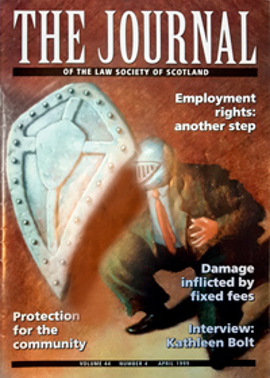You, EU and e-commerce too
We all know that the European Union is all about the free movement of goods and services in the Single Market, therefore you might wonder why there is such deep felt concern by our Government and the other Member States to regulate the internet and e-commerce.
The cynical amongst us might suggest that governments have spotted another source of taxable revenue and that they want to attack it like a shark on a drowning man. Others may suggest that the EU E-Commerce “Draft Directive” of 18th November 1998 is simply a way to establish a “clear objective of creating a common and coherent European legal framework by the year 2000”.
The Draft Directive contains several proposals which relate to the fundamental principles of e-commerce, such as the recognition and use of electronic signatures, privacy in telecommunications, encryption, distance selling, contract terms, copyright, data protection, advertising, consumer credit, the list goes on. The eagle eyed amongst you will have realised that we are set for a raft of legislation that will require close scrutiny and provide us with the opportunity to expand our client base, expertise and bank account.
To advise the companies who will be most affected by this legislation we will require, not only being expert in company law, contract, copyright, patents and data protection, etc, but also able to understand the electronic medium.
I am not suggesting that we will require to rush out and buy an anorak and an annual subscription to “Computers for Dunderheids” but we must be able to understand the language of these new clients and have an understanding of how their businesses operate.
E-commerce does not simply relocate the high street outlet with a green belt friendly website as can be demonstrated by the likes of Cisco systems, a company with an annual turnover of $8.5billion (of which 2/3rds is generated through the internet). This company does not produce anything! They simply take orders from customers then manage a database of manufacturers and distributors to get the best available price, all managed on the internet.
“Communities” can also be built on the Internet, such as ThirdAge, an American website with approximately 500,000 visitors a day. This provides free information and advice to senior citizens and thereby creates an opportunity for advertisers to get right to their very own niche market. Obviously the advertisers pay handsomely for this privilege.
Most of the “new” businesses that are developing are being developed in the US, however innovative new businesses are being developed in the UK and Europe. In his recent Budget, Gordon Brown announced financial help for new high tech businesses. In the US Bill Clinton has brought in a three-year moratorium on taxes for ecommerce, so there is a strong incentive on both sides of the Atlantic to exploit the electronic medium for profit.
The EU Directive will also have implications for the way in which we perform our daily work by increasing our potential to perform many tasks “on-line”, e.g. with certain exceptions Member States are obliged to ensure that their legislation allows contracts to be concluded electronically (Section 3, Article 9). There are exceptions to the type of contract that Member States can exclude, such as contracts requiring a notary, contracts governing family law, contracts that require to be registered with a public body and contracts relating to succession.
The guiding principle of the Directive (as set out in Article 1, para 1) is to “ensure the proper functioning of the internal market, particularly the free movement of Information Society services between the Member States” by demolishing any barriers or obstacles to the proper functioning of the internal market. We may safely assume therefore that our own Government will go a long way to facilitate the electronic transfer of essential business information in this country.
It would seem rational to suggest in light of the above that within the next five years we may reasonably expect to be dealing with Government bodies such as Companies House, The Land Register, The Scottish Legal Aid Board, local authorities, etc by electronic means, e.g. sending forms by e-mail that have been signed with an electronic signature and receiving electronic replies (including electronic bank credits). Article 8 of the EU Directive should be music to your ears as it hammers home the point that the supply of Information Society services may be rendered by “Regulated Professionals” who are subject to professional rules about how standards are met, i.e. client confidentiality, independence, fairness to the client, honour and dignity of the profession, etc.
The Draft Directive is a pretty ambitious and well intentioned initiative, setting out a framework for the provision of Information Society services. If you didn’t already know it, then the Directive and the subsequent legislation that we are about to experience should make it abundantly clear that an information revolution is presently taking place.
As in all revolutions there will be winners and there will be losers. The position that your firm will find itself in will largely depend upon how you respond to the undoubted opportunities that the revolution will bring.
Graham Walker is a partner of Graham Walker, Glasgow
In this issue
- Acronyms that speak louder than words
- Competition Act comes of age
- Act taps into every conscience
- Reshaping the criminal justice system
- Redundancy fears over fixed fees
- Another step in process of change
- Much tinkering, little change
- Interview: Kathleen Bolt
- You, EU and e-commerce too
- "Reasonable grounds" in search for drugs
- Civil law update of recent decisions
- Protecting designations of origin
- Standard securities and EU law - an oxymoron?
- Targeting high risk areas






